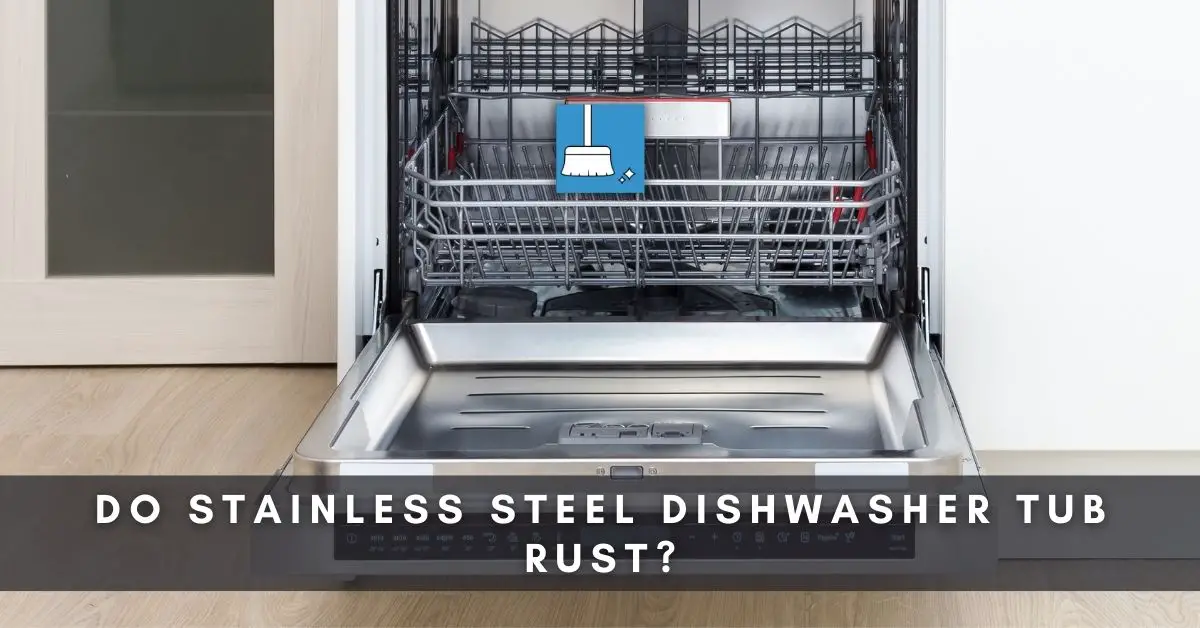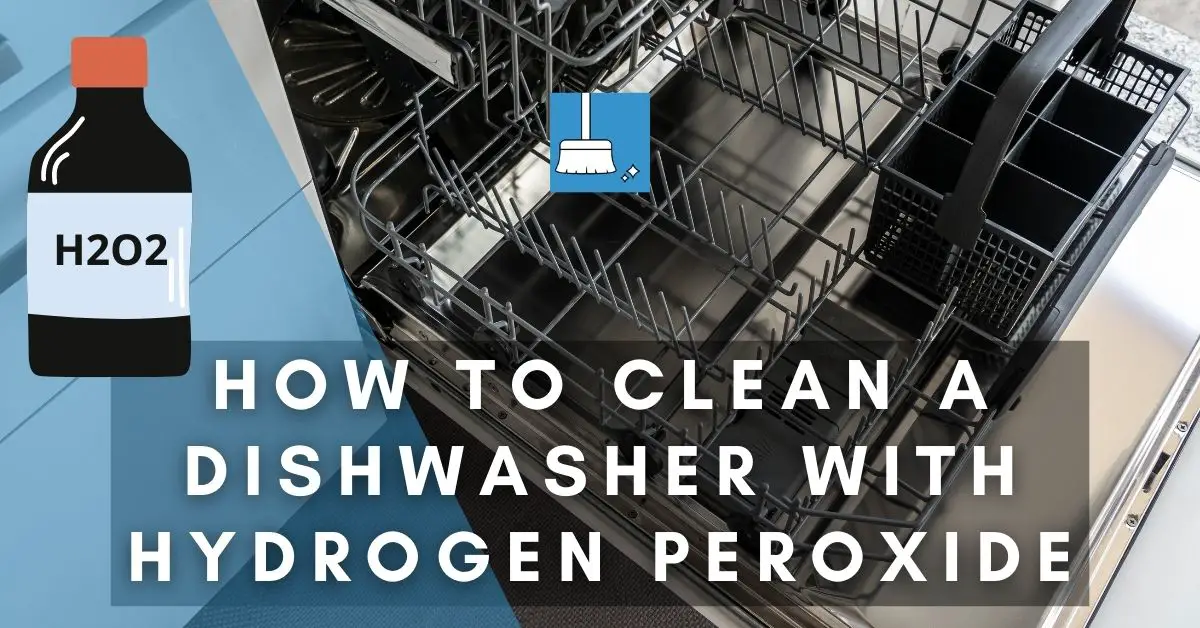With the rapid replacement of plastic dishwashers by stainless steel dishwashers in the market, questions abound if buying a stainless steel dishwasher tub is actually worth it.
The major concern has been tilted to the rust resisting ability of this new replacement, considering the fact that the heavy-duty plastic dishwasher tub offers better resistance to rust, making it last longer than the life of the machine.
Whether or not your stainless steel dishwasher tub will rust will be answered by this article. And other details and issues relating to your dishwasher and its proper use will be fully addressed.
Do Stainless Steel Dishwasher Tubs Rust?
Even with its corrosion resistant structural support, the stainless steel dishwasher tub will still rust with time. The unfavorable conditions like moisture, high temperature, and saltwater your stainless steel dishwasher tub is continuously exposed to will wear out the extensive protective passive film formed by the combined effects of chromium and nickel present in the stainless steel.
The loss of this thin layer paves the way for rusting which begins with pitting in your dishwasher tub.
What Can Cause Stainless Steel Tubs to Rust?
1- Moisture
Humid conditions of the inside of the dishwasher react with oxygen on the surface of the stainless steel, altering its state.
The effect of this is the appearance of rust over time. The longer the stainless steel is exposed to moist air, the faster it deteriorates.
2- Damaging Chemicals
Bleach and other chlorine products have damaging effects on stainless steel.
Detergents, especially those containing chlorine, produce a highly concentrated thin film layer that destroys the nickel component of stainless steel and removes the protective layer of chromium oxide.
When this protection is gone, the stainless steel completely loses its resistance to rust.
3- Hard Water
High levels of minerals, like calcium or iron in water, may react with chlorine – used for water treatment, to form chlorides that attack the steel, causing corrosion. This rusting can occur if you don’t have water softening systems in place or use well water.
4- Heat
Stainless steel has a high melting point and doesn’t melt at high temperatures.
However, the high temperature destroys the chromium oxide which acts as a protective layer, and also distorts the alloys; changing the structural integrity of this metal. This makes stainless steel susceptible to rust when a higher than normal temperature is applied.
Do Stainless Steel Tubs Rust When Cut?
Stainless steel does not rust when cut. Unlike galvanized steel, stainless steel has a structural consistency that makes it resistant to corrosion even when it is mechanically cut.
Even after cutting through stainless steel, the cut edges retain the metal’s ability to resist corrosion. The thin layer of chromium oxide forms immediately after chromium is exposed to atmospheric oxygen.
Can Stainless Steel Tub Rust In Salt Water?
Stainless steel becomes fragile in the presence of saltwater. Salt water contains dissolved ions which facilitate the movement of free electrons. This kind of environment speeds up the reaction between the iron part of the stainless steel and oxygen. The result of this is the formation of rust on the metal.
How long Does Stainless Steel Tub Last?
Stainless Steel (alone) if handled properly and kept away from unfavorable conditions, can last for more than 50 years. However, the usual life of dishwashers is 10-20 years. This means that your dishwasher tub should last until the whole machine is not in need of replacement.
The Stainless steel’s built-in corrosion resistance makes it durable, giving it a longer life span than other varieties of steel and metals.
How Can You Prevent Your Stainless Steel Dishwasher Tub From Rusting?
1- Reduce Exposure to Moisture
Spray the exterior of your stainless steel dishwasher tub with WD-40, clean with a dry cloth, and wash thoroughly with soapy water. WD-40 prevents moisture from getting into the pores of the steel metal, hence preventing rust buildup.
To reduce the humid air inside the dishwasher after a complete wash and dry cycle; leave the dishwasher door open for the moist air to escape rather than settling in the interior of your dishwasher.
2- Avoid Putting Non Dishwasher Safe Items into Your Stainless Steel Dishwasher
Cast iron pans should be washed by hand and not be run through the cycles of your dishwasher. Also, dishware with metallic decoration should never be put into your stainless steel dishwasher tub.
3- Use Good Quality Dishwasher Cleaner and Detergent
Dishwasher cleaners like Dual Action Dishwasher and Affresh Dishwasher Cleaner should be used for every wash cycle.
Also, make sure to use the full amount of detergent and rinse aid. This helps prevent rust stains from iron (that may be present in your water supply).
Shun detergents containing chlorine.
4- Reduce the Heat Buildup within Your Stainless Steel Dishwasher
Adjust the temperature of your dishwasher by adjusting the temperature of your water heater. If this is a challenge for you, consult your hot water heater manual or a service technician to adjust the temperature settings.
You can also open the dishwasher door after the rinse cycle and allow your dishes dry in the open air of your surrounding. This reduces the amount of heat that builds up within your dishwasher since the dry cycle is completely cut out.
High temperature destroys the steel. You want to be careful with the temperatures.
5- Never Put Rusty Items Into Your Stainless Steel Dishwasher
A rust spot on any dishware will be a risk to your stainless steel dishwasher. Carefully observe your utensils before filling your rack with them, as the rust may spread in the water and expose the steel to corrosion.
6- Check Your Water Supply Regularly
Most water pipes are made of galvanized steel, copper, or brass. These metals may react and cause corrosion within the pipes, thereby producing rust in the water delivered to your dishwasher.
Make a conscious effort to contact your plumber when you notice some changes in the water delivered by your pipes.
Limescale buildup or a film on your hands after washing should raise your concern about your water supply. And changes should be effected immediately.
7- Make Sure the Water Hardness Setting Is Appropriate
There is always an original program setting made available by most manufacturers. But water hardness varies from place to place. So depending on the hardness of your water supply, follow the instructions in your dishwasher instruction manual to put your dishwasher in a suitable hardness setting.
8- Rinse Every Item before Placing Them in the Dishwasher Rack
If this is kind of an ordeal for you, start your dishwasher with a rinse cycle before proceeding to a wash cycle. But never put dishes filled with food remnants and grease directly into a stainless steel dishwasher tub.
Is stainless steel Interior Dishwasher Better? (than plastic!)
Dishwashers with stainless steel interiors cost far more than those with plastic interiors. But this is not without some extensive qualities that give them their superiority, making them a better option.
Advantages of Stainless Steel Interior Dishwasher?
1- Quieter Cleaning Cycles: one of the frustrating complaints of dishwashers is the noise produced during the cleaning cycles. Stainless steel absorbs this unpleasant sound, reducing the noise that is produced.
2- Durability and Stain Resistance: stainless steel interior is firmly built and resistant to cracking. This limits the chances of an immediate replacement. It also gives greater resistance to staining and discoloration as compared to a plastic tub.
3- Endures Higher Temperature: Plastic tub interiors withstand temperatures within the range of 120-140°F. Stainless steel interior endures temperature up to 160°F, giving your dishes an efficient wash, free of bacteria.
4- Energy Efficient: Stainless steel interior holds the heat required for the drying cycle of the dishwasher. This dries the dishes faster cutting down the energy consumed by your dishwasher. With this, your billing for electricity is reduced.
Final Thoughts!
Your stainless steel dishwasher tub can last longer than you can imagine. It all depends on your readiness to take proper care of it and limit its exposure to those adverse conditions that can destroy its lifespan.
However, if you thought of getting yourself a stainless steel dishwasher, there definitely are extra benefits that it offers when compared to a plastic dishwasher.
And if you are worried about the rust resistance of your newly purchased stainless steel dishwasher tub, be sure of its resistance to corrosion. With just the right care, you can keep it running for many years.






Pingback: Can A Dishwasher Cause Rust? (How To Avoid?) »